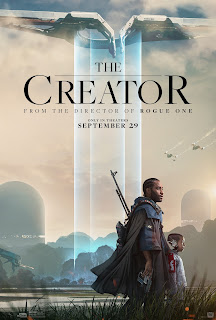Gareth Edwards follows up hits like Godzilla (2014) and Rogue One: A Star Wars Story (2016) with an epic sci-fi tale set in a dystopian future. After an A.I. (artificial intelligence) triggered nuclear strike on Los Angeles killed millions, the Americans have been targeting AI habitats. The last bastion is in A.I.-sympathetic New Asia, specifically seeking the ‘Nirmata’ or ‘Creator’ who has designed a highly advanced weapon.
The Nirmata created weapon is believed to be strong enough to halt the American air-borne military command centre called NOMAD and even end the world, or so the Americans believe. The Americans see AI as a threat, but in New Asia they are not malevolent. The ‘simulants’ have integrated into society. But the Americans brutally attack New Asia, the images having echoes of the Vietnam War.
As is often the case in Hollywood designed disaster/ war movies, it comes down to one man to save the day. In Edwards’ film, co-written with Chris Weitz, a former, now despondent soldier is recruited to find the deadly A.I. weapon and lead the Americans to Nirmata. John David Washington plays sergeant Joshua Taylor who enlists for the mission hoping it will lead him to his estranged wife Maya (Gemma Chan). The choice of character names is clearly no coincidence in this carefully designed drama which is divided into chapters such as ‘The Child’, ‘The Mother’, ‘The Friend’, making it obvious whose story arc is being explored.
The ‘weapon’ turns out to be a child, played with absolute brilliance by debutante Madeleine Yuna Voyles. Joshua’s commanding officer Colonel Howell (Allison Janney) instructs Joshua to destroy the weapon. As Joshua becomes more and more attached to the child who he names Alphie, he is reminded by fellow Americans that it is not a person. Indeed this is no child. When a kindly ‘aunt’ asks what she wants, expecting the response to be chocolate or ice-cream, she’s surprised when Alphie replies: ‘For robots to be free.’
The cautionary aspects of the scope and possibilities of an AI dominated world are glossed over in favour of a more compassionate approach that attempts to humanise ‘simulants’. Some even cry and fall in love. Despite the schmaltz, The Creator stands out for taking a position against the bullying superpower and offering respect for eastern philosophy and religions.
The Creator is a visually lush, well performed, futuristic drama wrapped around a lovey story. Imagine shades of Steven Spielberg’s A.I. Artificial Intelligence and Denis Villeneuve’s Arrival. But the script, that pits western skepticism and might against eastern spirituality and deference to tolerance, is clunky and doesn’t quite connect emotionally.



0 Comments